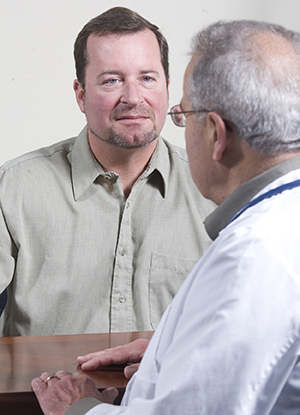Men: Protecting Your Fertility Before Cancer Treatment
Learning you have cancer can cause distress, anxiety, or depression. You may feel overwhelmed and scared. These are normal, common responses.
These feelings can be caused by many things. For instance, you may have a lot of questions about treatment and side effects. You may also have questions about how cancer care may harm your ability to have children (your fertility).
If you think you might want the option of having a child at some point after cancer treatment, you might be able to take steps to protect your reproductive health. But it's important to talk with your healthcare providers about this before starting treatment. And you may have to bring up the subject if your provider doesn't. Talk about what's important to you. Share your fears or concerns. Your cancer care team can talk with you about your options. They can also refer you to reproductive specialists.

Cancer treatment and your fertility
Not all cancer treatments may affect your ability to have children. It depends on many things, such as:
-
Your age
-
The type of cancer you have
-
The kind of treatment you'll have
-
The length and dose of that treatment
Here are a few ways in which common cancer treatments might affect your fertility:
-
Surgery. Certain organs or parts of them may need to be taken out to treat the cancer. This may mean reproductive organs, such as your prostate or testicles. In this case, you may have problems getting an erection after treatment (erectile dysfunction). You might have problems making sperm or semen. Or semen may no longer carry sperm out of your penis during ejaculation. Sometimes other surgeries done in your pelvic area (like to your bladder, colon, or lymph nodes) may harm your reproductive organs. That also could lead to fertility problems.
-
Radiation. High doses of radiation can kill cancer cells. This type of treatment can also affect nearby healthy cells. Radiation to your pelvis may cause changes in your reproductive organs. As a result, you may not be able to make semen or healthy sperm. If nerves, blood vessels, or both are damaged, you may have trouble getting erections. If you have radiation to your brain, it might harm your pituitary gland. Then it might not make the hormones needed to tell your body to make sperm.
-
Chemotherapy. Some of these medicines can damage your testicles so they no longer make sperm. This damage may last for a short time. Or it can be lifelong (permanent) damage.
-
Other treatments. You may need other treatments that may affect your reproductive system. These include hormone therapy, targeted therapy, immunotherapy, and stem cell transplant. Your healthcare provider can tell you more about the risks linked to the treatments you get.
Questions to ask about fertility preservation
If you think you may want to have children after your cancer care, talk with your healthcare provider right away. It’s best to talk about your concerns before you start treatment. This is when you tend to have more choices for preserving your fertility. Your provider may also have you meet with a reproductive specialist.
These questions can help you start the conversation:
-
What's the chance that my treatment may affect my fertility?
-
Will these changes be short-term or permanent?
-
What are my choices for protecting my ability to have children?
-
Do I have time to look into and possibly have my fertility preserved?
-
How long after treatment should I wait to try to have a child?
-
How much do fertility preservation methods cost? Does insurance cover it?
-
Do you recommend that I see a fertility specialist?
Your choices for preserving your fertility
Your healthcare provider can help you choose the best way to protect your fertility. Ask about any risks. These are the methods most often used for men with cancer:
-
Cryopreservation (sperm banking). This is the most common and easy option. It involves collecting a sample of semen. The sperm from the semen sample are frozen and stored. When you are ready to have a child, the sperm can be thawed for use.
-
Gonadal shielding (testicular shielding). This is done to help protect your testicles while you're getting radiation. During treatment, a lead shield is put on the outside of your body over your testicles. There's still a risk of radiation exposure, but shielding can help lower it.
-
Testicular sperm extraction (TESE). This procedure may be done if you don’t have sperm in your semen. The sperm are removed from your testicles. They can then be frozen for later use.
Researchers are studying new ways to protect the fertility of people who need cancer treatment. One of these may also be an option for you as part of a clinical trial. Talk with your provider or reproductive specialist to learn more.
Online Medical Reviewer:
Jessica Gotwals BSN MPH
Online Medical Reviewer:
Kimberly Stump-Sutliff RN MSN AOCNS
Online Medical Reviewer:
Todd Gersten MD
Date Last Reviewed:
3/1/2022
© 2000-2024 The StayWell Company, LLC. All rights reserved. This information is not intended as a substitute for professional medical care. Always follow your healthcare professional's instructions.